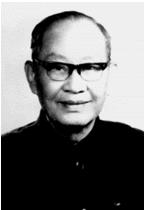Liao Mosha
Originally named Liao Jiaquan, Liao Mosha (Chinese: 廖沫沙) (1907-1990)was born on January 16, 1907 in Changsha, Hunan Province. When he was a student at Changsha Normal School in 1922, Liao helped set up a literary club and edit literary periodicals in cooperation with He Luting, then a would-be musician. Liao himself once had been an assistant editor to a daily’s supplement. After he moved to Shanghai in 1927, he audited classes in the literature department of Shanghai Art University run by Tian Han and meantime wrote dramatic and fictional articles for such magazines as Southern Country Monthly and other papers. Among the works he produced in those days, the most readable is Swallow Cliff, a play. He became an editor with both the Tomorrow Book Store and Far East Daily in 1932 and wrote a number of essays until 1934 when he was admitted to the China League of Left-Wing Writers. During the period from 1938 to the mid-1940s, he worked successively with Resistance Daily in Hunan, Salvation Daily in Guilin, the evening edition of Chinese Merchant Daily in Hong Kong, and Xinhua Daily in Chongqing. It was not until the War of Resistance against Japan was over that he returned to Hong Kong to resume editing for Chinese Merchant Daily and eventually became its co-editor-in-chief. Several historical stories he wrote during the war were collected and published in 1949 under the title A Double-dealing: To Call a Stag a Horse. It lampoons the state of affairs just prior to liberation of 1949 by alluding to the malfeasance of Zhao Gao (?-207 B.C.), the great eunuch-conspirator of the Qin Dynasty.
After 1949, Liao was appointed successively to the positions of deputy head of the Propaganda Department of the Beijing Municipal Party Committee, head of the Education Department and of the United Front Work Department affiliated with the Committee, and vice-chairman of the Beijing People’s Political Consultative Conference and a member of the Chinese People's Political Consultative Conference (CPPCC). He joined the Chinese Writers' Association in 1962. For a time, Liao Mosha, Xia Yan and others contributed to a column called “Copious and Brief Notes.” Later, Liao, Deng Tuo, and Wu Han wrote for the column of “Sketches of a Three-family Village.” These articles were popular with an ever increasing readership for the realism and sharpness with which they raised controversial questions about contemporary life in China. Eventually, however, the “Three-family Village” pieces became the basis for an unfounded charge against the authors, who were accused in May 1965 of being part of the “anti-Party coterie” and persecuted cruelly until 1979, when they were rehabilitated.
Liao died on December 27, 1990 at the age of 83.
His main works include “In the Human World” (1934), “On ‘the Decorative Literature’” (1934), “Sacrifice in Night” (1944), “A Visit to Xianyang” (1944), “Phoenix” (1944), “Li Ying” (1944), “ ‘History’ and ‘Play’” (1961), “It’s Not Harmful to Have the Ghost in a Play” (1961), “Zheng Banqiao’ Two Letters to His Family”(1962), and “To Play a Bit Role First” (1962).
